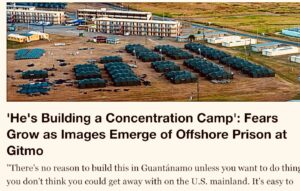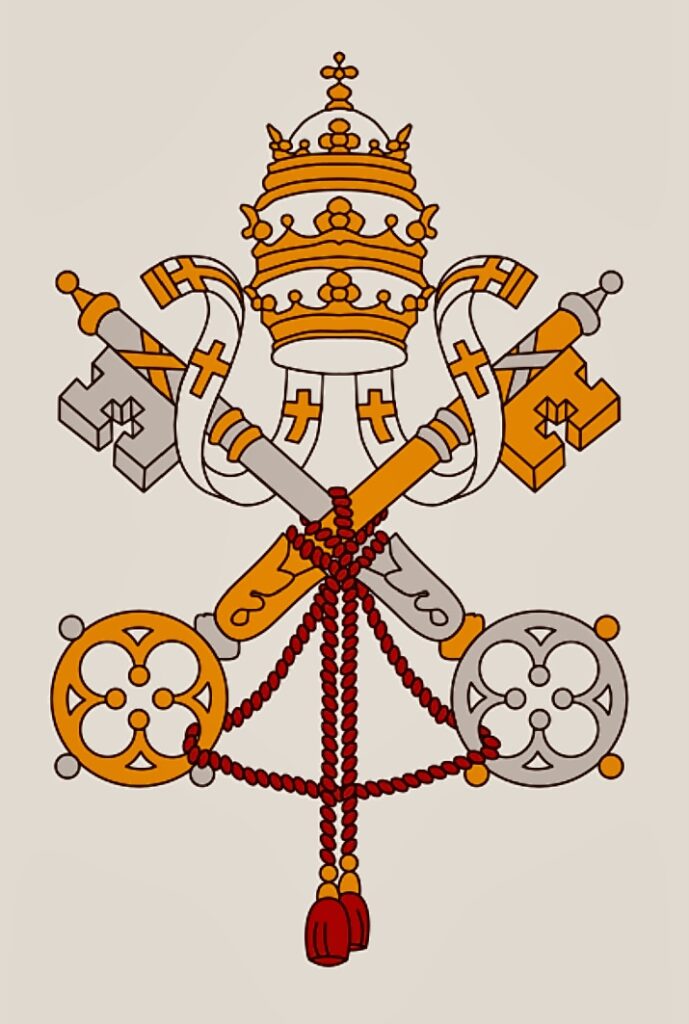I’m not sure Pope Francis would endorse my headline. But I didn’t ask his permission. He ostensibly wrote this letter to the (all-male) U. S. Catholic bishops, not to Quakers (or Quaker adjacents, who make up the bulk of this blog’s audience).

But instead he released it to via the official Vatican website, in English & Spanish, which amounts to sending it to the world. And for that matter, Quakers flatter ourselves as being open to the movings of the universal Spirit from other corners than our own; if that’s so, this letter is a fine opportunity. So I don’t think Francis will mind my turning it into a guest blog post.
Which I decided to do after reading it over, and finding it one of the best statements about the combination immigration-and-governance crisis we’re sinking into here in Orange Gringo land.
Let’s hope his missive is arriving in the nick of time.
The letter is superior in many ways: first of all, clearly written, easily understandable even by non-religious folks; yet it shows full command of some of the deepest & most broadly appealing points of Roman Catholic social witness, borne lightly, but presented cogently.
The text is also astute, in that it avoids the other points where the RC witness is abrasive & (properly) contested — you know, abortion, LGBT, priestly pedophilia, women, and such.
This is not papal gaslighting or evasion, but proper pushback coalition-building: yes, we’ll have to struggle about the rest of these, but that’s for later: dammit, our collective house is being set afire, and Francis has showed up to grab a firehose, and to point it not only at the flames, but at the arsonists.
Perhaps most important, the letter calls out some of the most determined tiki-torchbearers, setting their blazes from a base within what’s supposed to be Francis’s own Catholic domain, one he knows all too well: the Catholic church’s triumphalist right wing has been one of the main purveyors of pious fascism for a century and more.
Today it is awash with dark money, and led by skillful, low-profile fanatics who have bought it, among other prizes, control of the Supreme Court, and planted its protégé a heartbeat away from an American presidency crucially guided by such models as Hungary’s Orban.
This right wing has also fixed on this pope as its mortal enemy. Whenever I remember, I say a prayer that Francis, who lives in a church guesthouse in Rome, has someone discreetly tasting his food; there are many in his orbit counting the days until his death, and I believe some are surely wondering how it might be hastened.
By doctrine and tradition, Francis is their ruler. Yet he does not give orders here; I detect no imperiousness. The letter is the power of words, speaking truth to the power of Mammon and its surging lawlessness.
So enough introduction. Now let Francis and his words speak. And as the Gospel of Matthew says, “They that have ears to hear, let them hear.”
Dear Brothers in the Episcopate,
I am writing today to address a few words to you in these delicate moments that you are living as Pastors of the People of God who walk together in the United States of America.
1. The journey from slavery to freedom that the People of Israel traveled, as narrated in the Book of Exodus, invites us to look at the reality of our time, so clearly marked by the phenomenon of migration, as a decisive moment in history to reaffirm not only our faith in a God who is always close, incarnate, migrant and refugee, but also the infinite and transcendent dignity of every human person.
2. These words with which I begin are not an artificial construct. Even a cursory examination of the Church’s social doctrine emphatically shows that Jesus Christ is the true Emmanuel (cf. Mt 1:23); he did not live apart from the difficult experience of being expelled from his own land because of an imminent risk to his life, and from the experience of having to take refuge in a society and a culture foreign to his own. The Son of God, in becoming man, also chose to live the drama of immigration. I like to recall, among other things, the words with which Pope Pius XII began his Apostolic Constitution on the Care of Migrants, which is considered the “Magna Carta” of the Church’s thinking on migration:
“The family of Nazareth in exile, Jesus, Mary and Joseph, emigrants in Egypt and refugees there to escape the wrath of an ungodly king, are the model, the example and the consolation of emigrants and pilgrims of every age and country, of all refugees of every condition who, beset by persecution or necessity, are forced to leave their homeland, beloved family and dear friends for foreign lands.”
3. Likewise, Jesus Christ, loving everyone with a universal love, educates us in the permanent recognition of the dignity of every human being, without exception. In fact, when we speak of “infinite and transcendent dignity,” we wish to emphasize that the most decisive value possessed by the human person surpasses and sustains every other juridical consideration that can be made to regulate life in society. Thus, all the Christian faithful and people of good will are called upon to consider the legitimacy of norms and public policies in the light of the dignity of the person and his or her fundamental rights, not vice versa.
4. I have followed closely the major crisis that is taking place in the United States with the initiation of a program of mass deportations. The rightly formed conscience cannot fail to make a critical judgment and express its disagreement with any measure that tacitly or explicitly identifies the illegal status of some migrants with criminality. At the same time, one must recognize the right of a nation to defend itself and keep communities safe from those who have committed violent or serious crimes while in the country or prior to arrival. That said, the act of deporting people who in many cases have left their own land for reasons of extreme poverty, insecurity, exploitation, persecution or serious deterioration of the environment, damages the dignity of many men and women, and of entire families, and places them in a state of particular vulnerability and defenselessness.
5. This is not a minor issue: an authentic rule of law is verified precisely in the dignified treatment that all people deserve, especially the poorest and most marginalized. The true common good is promoted when society and government, with creativity and strict respect for the rights of all — as I have affirmed on numerous occasions — welcomes, protects, promotes and integrates the most fragile, unprotected and vulnerable. This does not impede the development of a policy that regulates orderly and legal migration. However, this development cannot come about through the privilege of some and the sacrifice of others. What is built on the basis of force, and not on the truth about the equal dignity of every human being, begins badly and will end badly.
6. Christians know very well that it is only by affirming the infinite dignity of all that our own identity as persons and as communities reaches its maturity. Christian love is not a concentric expansion of interests that little by little extend to other persons and groups. In other words: the human person is not a mere individual, relatively expansive, with some philanthropic feelings! The human person is a subject with dignity who, through the constitutive relationship with all, especially with the poorest, can gradually mature in his identity and vocation. The true ordo amoris that must be promoted is that which we discover by meditating constantly on the parable of the “Good Samaritan” (cf. Lk 10:25-37), that is, by meditating on the love that builds a fraternity open to all, without exception. [3]
7. But worrying about personal, community or national identity, apart from these considerations, easily introduces an ideological criterion that distorts social life and imposes the will of the strongest as the criterion of truth.
8. I recognize your valuable efforts, dear brother bishops of the United States, as you work closely with migrants and refugees, proclaiming Jesus Christ and promoting fundamental human rights. God will richly reward all that you do for the protection and defense of those who are considered less valuable, less important or less human!
9. I exhort all the faithful of the Catholic Church, and all men and women of good will, not to give in to narratives that discriminate against and cause unnecessary suffering to our migrant and refugee brothers and sisters. With charity and clarity we are all called to live in solidarity and fraternity, to build bridges that bring us ever closer together, to avoid walls of ignominy and to learn to give our lives as Jesus Christ gave his for the salvation of all.
10. Let us ask Our Lady of Guadalupe to protect individuals and families who live in fear or pain due to migration and/or deportation. May the “Virgen morena”, who knew how to reconcile peoples when they were at enmity, grant us all to meet again as brothers and sisters, within her embrace, and thus take a step forward in the construction of a society that is more fraternal, inclusive and respectful of the dignity of all.
Fraternally,
Francis
From the Vatican, 10 February 2025



Why did he not address the inhuman injustices in Gaza and West Bank?
“Pope Francis calls situation in Gaza ‘shameful'”:
https://www.voanews.com/a/palestinian-health-officials-say-gaza-death-toll-tops-46-000/7930745.html
1.1 million deported by Biden in 2023, and he said NOTHING, just like most Democrats and Quakers.
Excellent! Go Francis! ❤️☮️